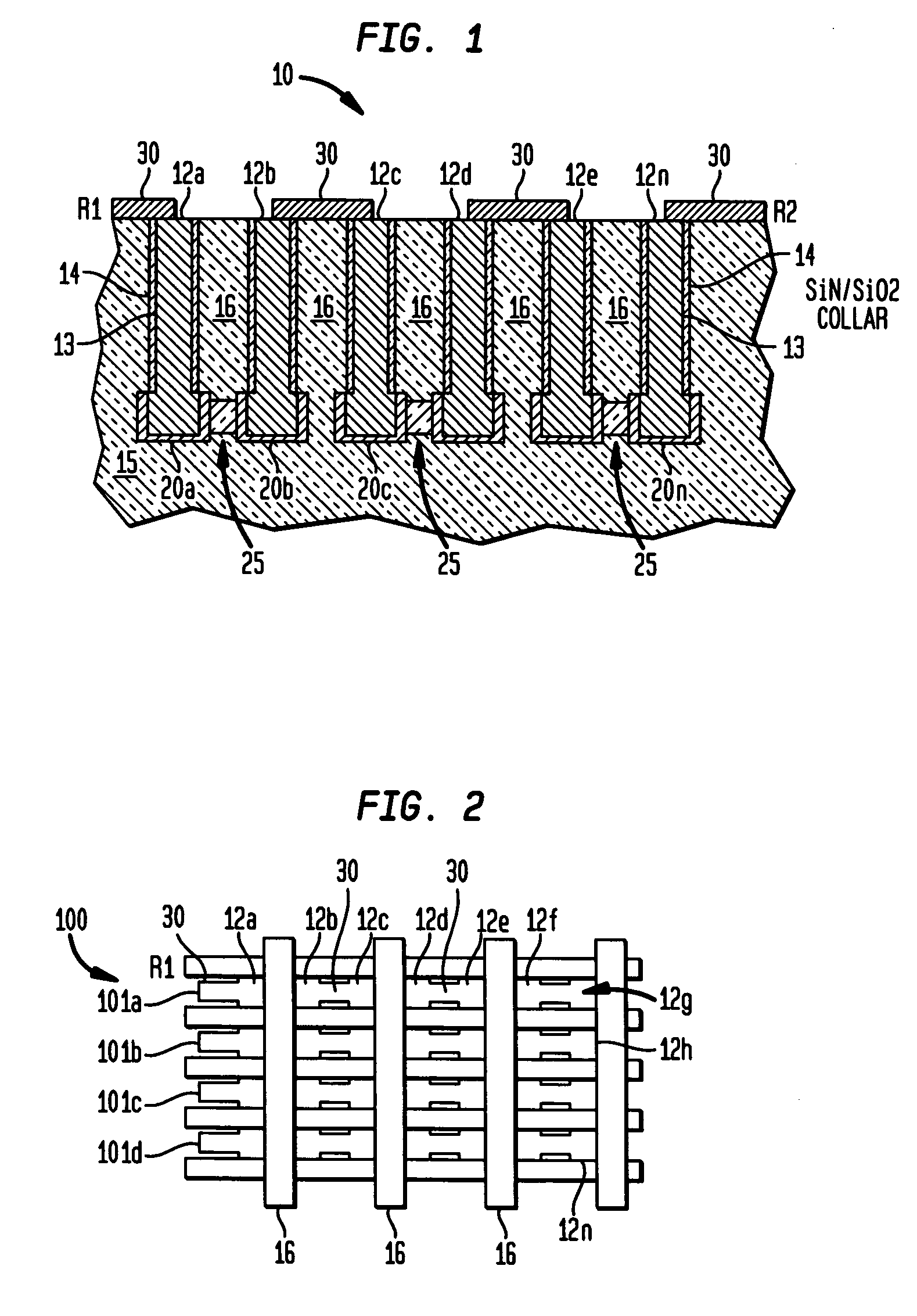Trench type buried on-chip precision programmable resistor
a precision programmable resistor and on-chip technology, applied in the field of electromechanical devices, can solve the problems of temperature resistance variation and space occupancy, and achieve the effect of precise resistance value, small surface area of space, and low nois
- Summary
- Abstract
- Description
- Claims
- Application Information
AI Technical Summary
Benefits of technology
Problems solved by technology
Method used
Image
Examples
first embodiment
[0021]FIG. 1 illustrates a cross-sectional view of a trench type buried resistor 10 according to the invention. As shown in FIG. 1, the trench buried type resistor includes a series of trenches 12a, 12b, . . . , 12n formed in a substrate 15, aligned, for example, in a row, with each trench separated by a dielectric region 16, e.g., an oxide. Each trench 12a, 12b, . . . , 12n is filled with a conductor material 13 such as Tantalum Nitride (TaN) or Polysilicon, and each trench includes a buried plate bottom connective portion 20a, 20b, . . . , 20n. As shown in FIG. 1, between alternating adjacent first trenches, e.g., trenches 12a, 12b and 12c, 12d, etc., there are formed ion implantation bands 25 comprising ion implanted doped substrate material that connect these adjacent trenches in alternating fashion. Likewise, between alternating adjacent second trenches 12b, 12c and 12d, 12e etc., there are formed top surface resistive connective portions 30 that connect these adjacent trenches...
second embodiment
[0026]FIG. 3 illustrates a cross-sectional view of a trench type buried resistor 50 according to the invention. As shown in FIG. 3, the trench buried type resistor includes a series of trenches 52a, 52b, . . . , 52n formed in a substrate 55, aligned, for example, in a row, with each trench separated by a dielectric region 56, e.g., an oxide. Each trench 52a, 52b, . . . , 52n includes a buried thin layer 53 of conductive material such as TaN or Polysilicon, shaped in conformance with the shape of the trench and having side 53a,b and bottom 53c portions. This thin conductive material layer may range between 50 Å and 500 Å in thickness depending upon the desired resistance, e.g., as dictated by circuit requirements. Between each trench 52a, 52b, . . . , 52n there is formed a top surface resistive connector portion 60 that connects each buried thin layer 53 (conductive layer sidewalls 53a,b) of a trench with the buried thin conductive layer 53 of an adjacent trench, thus forming a serie...
PUM
 Login to View More
Login to View More Abstract
Description
Claims
Application Information
 Login to View More
Login to View More - R&D
- Intellectual Property
- Life Sciences
- Materials
- Tech Scout
- Unparalleled Data Quality
- Higher Quality Content
- 60% Fewer Hallucinations
Browse by: Latest US Patents, China's latest patents, Technical Efficacy Thesaurus, Application Domain, Technology Topic, Popular Technical Reports.
© 2025 PatSnap. All rights reserved.Legal|Privacy policy|Modern Slavery Act Transparency Statement|Sitemap|About US| Contact US: help@patsnap.com



